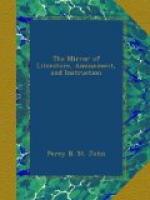London Magazine.
* * * * *
WINE DRINKING.
Use a little wine, for thy stomach’s sake.
I Tim. v. 23.
So says St. Paul—and this seems to have been the opinion of the most ancient philosophers and physicians. A moderate use of it has been sanctioned by the wise and good in all ages. Those who have denied its virtues are those who have not been able to drink it. Asclepiades wrote upon wine, the use of which he introduced with almost every remedy, observing, that the gods had bestowed no more valuable gift on man: even the surly Diogenes drank it; for it is said of him, that he liked that wine best, which he drank at other people’s cost—a notion adopted by the oinopholous Mosely, who, when asked, “What wine do you drink, doctor?” answered, “Port at home—claret abroad!”
Hippocrates, the father of physic, recommends a cheerful glass; and Rhases, an ancient Arabian physician, says, no liquor is equal to good wine. Reineck wrote a dissertation “De Potu Vinoso;” and the learned Dr. Shaw lauded the “juice of the grape.” But the stoutest of its medical advocates was Tobias Whitaker, physician to Charles II., who undertook to prove the possibility of maintaining life, from infancy to old age, without sickness, by the use of wine!
It must, however, be remembered, that Whitaker was cordially attached to wine, and a greater friend to the vintner than to the apothecary, having as utter a dislike to unpalatable medicines, as the most squeamish of his patients; therefore, Dr. Toby’s evidence must be taken with caution, independently of the courtly spirit that might have led him to adapt his theories to the times.
It has been questioned whether the use of wine was known to the antediluvian world; but there can be do doubt, in the corrupt state of man, that wine would have its share in his debasement, and it may be very strongly inferred, from the circumstance that Noah planted a vineyard, and, moreover, “that he drank of the wine, and was drunken,” (Gen, ix. 20.)—a sad stain in the character of a man who was “perfect in his generation;” and which also proves that, in the earliest period of the world, the very best of men were liable to fall into error and excess.
But the antiquity and propriety of wine-drinking is not matter of question. The archbishop of Seville, Antonio de Solis, who lived to be 110 years old, drank wine; and even that wonderful pattern of propriety, Cornaro, did the same: but the question is about quantity. Sir William Temple was pleased to lay down a rule, and limit propriety to three glasses. “I drink one glass,” says he, “for health, a second for refreshment, a third for a friend; but he that offers a fourth is an enemy.”




